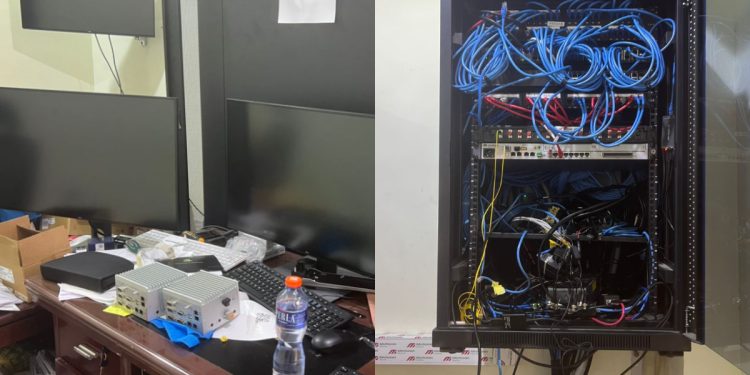Strategic Mobilization Ghana Limited (SML) is accusing operatives from the Office of the Special Prosecutor (OSP) and National Security of dismantling its state-of-the-art real-time monitoring infrastructure—an act the company says could cost Ghana millions of cedis in lost customs revenue daily.
Images show how vital equipment of SML, including monitors, servers, computers, and other essential technology components, was ripped apart during the raid.
Cables torn, screens shattered, systems crippled
Inside SML’s operations center, scenes resembled the aftermath of a break-in.
Photos show dismembered cables snaking out of destroyed computer racks, gaping spaces where servers and processors once stood, and monitors taken entirely.
Entire terminal walls—once aglow with customs transaction data—now sit lifeless.
Personnel evacuated, operations paralysed
Technicians and administrative staff were reportedly ordered to vacate the premises during the operation, which SML says lasted hours and appeared more destructive than investigative.
They removed essential infrastructure and command systems and disrupted months—if not years—of operational data flows.
The impact on customs oversight will be immediate and severe.
Revenue risks mount as monitoring goes dark
With the monitoring system now inoperative, immediate concerns are being raised about the fiscal consequences.
SML warns that the Customs Division of the Ghana Revenue Authority (GRA), which depended on this real-time data for fuel tracking and port surveillance, will be severely handicapped in its operations.
Destruction sparks outcry
The destructive nature of the operation is raising eyebrows since SML insists it has been cooperating with the OSP.
The development occurred despite what SML describes as full cooperation with the OSP since March 2025, including the provision of extensive documentation and technical data.
Surveillance system covered fuel depots and port activities
The real-time surveillance system developed by SML under contracts with GRA had been monitoring fuel depots, customs activity at ports, and other sensitive points in Ghana’s revenue pipeline.
Massive document submission made ahead of raid
Documentation seen by this paper shows that on March 20, 2025, Sam Okudzeto & Associates, legal counsel for SML, formally responded to a March 13 request from the OSP.
In that response, the law firm expressed SML’s readiness to provide the requested data and asked for additional time due to the volume of documentation involved.
By March 27, 2025, SML submitted a detailed packet to the OSP. The OSP and national security vowed never to give up on SML.
List of documents submitted
It includes an employee master list along with the CVs of key management and technical staff; all technical and financial proposals submitted by SML to the Ghana Revenue Authority (GRA) and the Ministry of Finance (MoF); all correspondence between SML, GRA, and MoF and contract agreements and related documentation covering contracts signed with both the GRA and MoF.
Others include a comprehensive list of equipment and software procured by SML for GRA/MoF projects, detailing the suppliers, cost prices, dates of acquisition and installation, and the locations of installations.
Performance reports and financial records
The submission also covers all performance reports delivered by SML to GRA/MoF (with the first batch already submitted and a second batch expected the following week), as well as SML’s annual financial statements and management accounts from 2017 to 2024, and the general ledger for each of those accounting years.
11 documents SML did not provide
In the same letter, SML indicated that it does not possess, control, or have custody of eleven specific documents requested by the OSP.
These include: responses received from GRA and MoF regarding proposals submitted by SML; minutes of all meetings held with GRA and/or MoF; all invoices submitted by SML to GRA/MoF for payment and receipts issued to GRA/MoF for payments received; cheque registers.
The rest are receivable and payable reports for the stated period; the fixed asset register; evidence of capital contributions by SML shareholders; SML’s chart of accounts; and its accounting procedures manual (if any), along with any other relevant information.
Non-disclosure clauses and legal boundaries cited
The law firm explained that SML was unable to provide the outstanding documents listed in the OSP’s letter dated March 3, 2025, due to binding contractual obligations of non-disclosure and confidentiality with third parties.
OSP accusations deemed vague
SML’s lawyers also pushed back against what they described as vague accusations from the OSP.
In their correspondence, they argued that the Special Prosecutor had not clearly defined the corruption or corruption-related offenses it was investigating under Section 79 of the OSP Act (Act 959).
As OSP and national security deliver a decisive blow to SML, exposing critical system vulnerabilities, what will be the next action?
Given these circumstances, the law firm asserted SML’s right to privilege against self-incrimination, as protected under Section 97 of the Evidence Act, 1975 (NRCD 323).
Motives questioned as public outrage grows
The shocking scale and timing of the raid have sparked speculation that the real motive may not be purely investigative.
Some industry watchers suggest that the destruction of SML’s surveillance infrastructure may benefit entrenched interests threatened by the company’s data-driven oversight of Ghana’s petroleum and customs sectors.
Authorities remain silent as operations halted
Neither the OSP nor National Security has publicly commented on the reasons for the raid or the apparent destruction of assets.
In the meantime, SML’s offices remain quiet, its servers dark, and its once-bustling operations centre at OSU now a shell of disjointed cables and missing machines.











